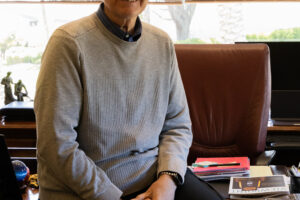For the past two weeks, students, faculty and alumni of Point Loma Nazarene University have been expressing their concerns, questions and opinions regarding the suspension of Mark Maddix, dean of the School of Theology and Christian Ministry.
While the administration has not commented on the reasons behind Maddix’s removal due to fear of litigation (according to a campus update email sent out by the Provost on April 11), Provost Kerry Fulcher said that it has nothing to do with university policies on the LGBTQIA+ community. Many community members have found this hard to believe, as some think that Maddix was protecting a colleague who is affirming of the LGBTQIA+ community.
The news sparked conversation and deep levels of concern for many on campus, especially students. On Friday, April 14, students held a silent protest outside of chapel regarding PLNU’s policies on the queer community.
While The Point has previously been unable to get an interview with Fulcher regarding recent events, Fulcher spoke with a Point reporter this week, providing more information about recent events. Fulcher attended Glen Laster’s Civil Rights Pilgrimage class on Wednesday, April 19 to speak with students from the class about recent events. The group went on a pilgrimage visiting civil rights historical sights in the south over PLNU’s spring break, and Fulcher attended. The Point reporter, who was in the class, was able to speak with Fulcher after.
TP: There’s been a lot of language circulating on whether “suspended” or “fired” is the correct language to use for the situation with Maddix. What is the correct term, and what does that term mean?
KF: There’s two terms. Suspension can happen while someone still is employed. It’s suspension from duties. Dr. Maddix was suspended from his dean duties while this process rolls out. That’s all in the handbook, and it’s outlined that you can suspend someone, either with or without pay. In this case it’s with pay, until the process unfolds. Dismissal would be a different thing. That could be the end of suspension, or the faculty could come off of suspension.
TP: Are there, for at-will administrators, any checks and balances for when suspension happens? Do you ask members of the department to evaluate them as an administrator, or is it a top-down thing?
KF: It would depend on the nature of the issues. Because my direct reports have a variety of responsibilities, if it were issues that were coming up from their role as academic unit leader, then of course I would have those conversations. If it’s at the level of engagement with the same level of people they work with, I would have those conversations. If it’s at the level of administrative roles that work with just me, then I would consult with, and this is in any case [and] for any dismissal, human resources [and] the president, because ultimately the president is the one to dismiss. So it really depends on the nature of the issue, and so you consult with the appropriate people based on the nature of the issue.
TP: For the situation with Melissa Tucker, you said it’s incorrect to say she was fired?
KF: Correct.
TP: And can you remind me of what the technicality on that is?
KF: The specifics of Melissa Tucker I can’t comment on. From a status standpoint, an adjunct is under a contract from a beginning and an ending date. So you can’t terminate someone who is not currently under contract.
TP: Can you comment on whether or not Maddix is moving to take legal action, and file a lawsuit?
KF: He’s indicated that publicly, in the newspaper.
TP: So I know there are SLAF (Student Life and Formation) meetings happening this week, are you planning on attending those?
KF: Only if asked. I’m willing to be present at any meeting, but I don’t want to be present if my presence is going to cause any sort of triggering, or silencing, because of the way in which the narrative was connected and then the fear that people have associated with that. I don’t want to exacerbate any of that. So, I am willing to be a part of any meeting that I am asked to be a part of.
TP: Okay. I have two questions about language that is being used by everyone right now. The first one is why was the term “Third party” chosen?
KF: It was trying to distinguish between the two parties that are named, Maddix and either the university or myself depending on how you view that. So it’s someone who’s not directly involved.
TP: Thank you.
KF: And I understand that people have interpreted that in a variety of ways that was not intended. But you have two parties involved, so it’s a third party, it’s someone not directly involved.
TP: Right. And then, I also have heard comments on this being a “polarizing” issue, both in the April 11 email and in class. I’m curious as to what you mean when you describe it that way. Just from a different experience, I would not think of it as necessarily polarizing. So what do you mean when you say that, and what are you saying is causing that polarization?
KF: So, to clarify, when you say this issue, are you talking about the suspension of Dr. Maddix or LGBTQ related issues?
TP: LGBTQ.
KF: Coming up in the culture wars of the 80s, as a biologist, creation evolution was kind of the thing polarizing, which in my understanding means two very vocal sides that are trying to agree, but it’s all or nothing, either/or. That doesn’t leave any room for any middle space, or any nuance to exist. So, within the church, in general, that narrative has been framed in that way. Either you have to be totally against LGBTQ, or you have to be totally affirming of LGBTQ. And so the question is, is there nuance or room in the middle for something? The way that often gets articulated, let’s say on the more conservative side, if you will, theologically, is that someone can’t even identify as same-sex attracted. You just pray that away, you just make a different decision.
Whereas, on the other side, you can’t love someone unless you are affirming. So, those are both part of almost a lockstep—a position that the two poles take. The communication is trying to drive people there and leave no room for discussion. I would say that most of our cultural issues of the day are in a polarized context. Think of the politicization of all the issues when it comes to a two party system, republican and democrat, there’s almost no middle ground anymore.
TP: I was wondering if you are planning, and how you might be planning, to make a response to the queer community on campus. I think that regardless of whether or not that was related to the suspension, either way this has exposed some hurt on campus. I think it has been exposed that the handbook says students need to be treated with respect, love and dignity, and it is clear some students don’t feel that has happened. Are you planning on making a response? Other than the email from Dr. Augustine?
KF: I’ll have to have a conversation about that. What I’ve done personally, is I’ve reached out to the Voices of Love leadership and said I am willing to talk. But again, I don’t want to unless I am invited, because I don’t want to exacerbate anything. And I would have to have a conversation with Dr. Brower, who’s currently out of town, and others about whether me sending another email is just going to add fuel to the fire, or whether it will be helpful. I’m certainly doing it on a one-on-one and group basis, in terms of the students. I’m happy to talk with anyone, in regard to that, but I don’t want to force my way in. I also don’t want to, well, it seems like in the context now, with all the various communications people are pulling apart, they’re polarizing. So does another message from me actually increase that polarizing, or does it bring together? If I felt that it would help bring together, I would certainly do that. But again, I would want to have conversations before.
TP: In class, Dr. Augustine said that you saw an opportunity with the civil rights class for Point Loma to go further in our commitment to diversity. And you took that opportunity. Do you see this as an opportunity for Point Loma to try and go further in how we include queer students?
KF: And by this, what are you referring to?
TP: These events, the recent events on campus. Are they an opportunity for Point Loma to take a step in a new direction?
KF: Yeah, and that also builds into what Dr. Augustine does. All of that is obviously couched within the University’s positions. But how do we live those out? Any incident that happens that creates opportunity for dialogue, and further communication and understanding, this is one of those I would fully expect we are going to learn from and move into better places.








